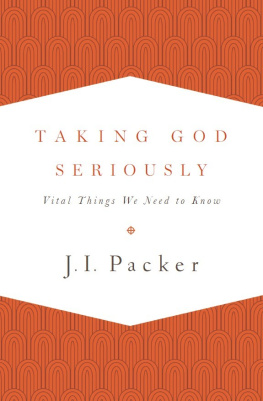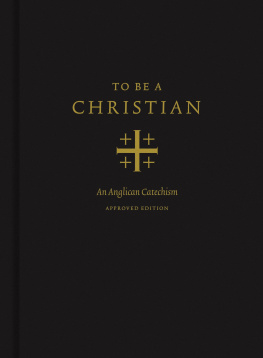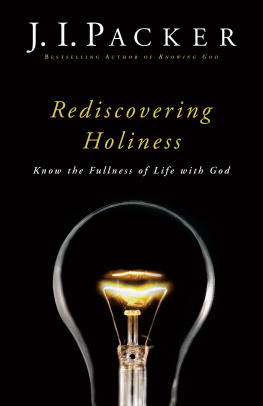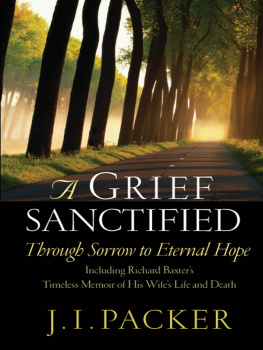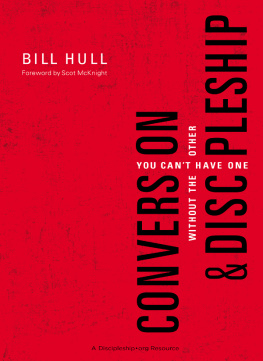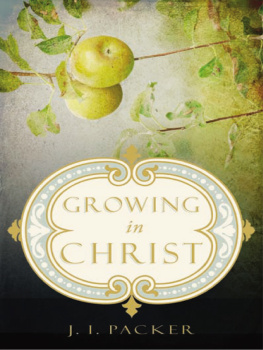J. I. Packer - Taking God Seriously: Vital Things We Need to Know
Here you can read online J. I. Packer - Taking God Seriously: Vital Things We Need to Know full text of the book (entire story) in english for free. Download pdf and epub, get meaning, cover and reviews about this ebook. year: 2013, publisher: Crossway, genre: Religion. Description of the work, (preface) as well as reviews are available. Best literature library LitArk.com created for fans of good reading and offers a wide selection of genres:
Romance novel
Science fiction
Adventure
Detective
Science
History
Home and family
Prose
Art
Politics
Computer
Non-fiction
Religion
Business
Children
Humor
Choose a favorite category and find really read worthwhile books. Enjoy immersion in the world of imagination, feel the emotions of the characters or learn something new for yourself, make an fascinating discovery.
- Book:Taking God Seriously: Vital Things We Need to Know
- Author:
- Publisher:Crossway
- Genre:
- Year:2013
- Rating:5 / 5
- Favourites:Add to favourites
- Your mark:
- 100
- 1
- 2
- 3
- 4
- 5
Taking God Seriously: Vital Things We Need to Know: summary, description and annotation
We offer to read an annotation, description, summary or preface (depends on what the author of the book "Taking God Seriously: Vital Things We Need to Know" wrote himself). If you haven't found the necessary information about the book — write in the comments, we will try to find it.
Explaining the essentials of the faith, renowned theologian and author Dr. J. I. Packer outlines the core commitments that are common to those of us who profess belief in Jesus. Here is a call to discipleship in mere Christianitythe business of taking God seriously.
Taking God Seriously: Vital Things We Need to Know — read online for free the complete book (whole text) full work
Below is the text of the book, divided by pages. System saving the place of the last page read, allows you to conveniently read the book "Taking God Seriously: Vital Things We Need to Know" online for free, without having to search again every time where you left off. Put a bookmark, and you can go to the page where you finished reading at any time.
Font size:
Interval:
Bookmark:
Thank you for downloading this Crossway book.
Sign-up for the Crossway Newsletter for updates on special offers, new resources, and exciting global ministry initiatives:
Crossway Newsletter
Or, if you prefer, we would love to connect with you online:
Google +

When a person falls into convulsions, short-term remedies may for the moment calm him down, but the long-term need is to diagnose the root cause of his trouble and treat that. So it is today with churches round the world, including the worldwide Anglican Communion, a body that is over seventy million strong and growing by leaps and bounds in both Asia and Africa. A much-publicized Episcopal decision in Canada to bless same-sex unions as if they were marriages, as well as the consecrating in the United States of a diocesan bishop who unashamedly lives in such a union, has convulsed global Anglicanism in the way that pebbles thrown into a pond send ripples over the entire surface of the water. Pressure groups and leadership blocs have emerged in Anglicanisms Old West (Britain, North America, Australasia) resolved to fight this issue till approval of gay pairings is fully established. Tensions over the question between and within provinces, dioceses, and congregations have become acute, and there is no end in sight.
What, we ask, is the root cause of these convulsions? What would be needed to get us beyond them? The fact we must face is that the clash of views on how, pastorally, to view and help male and female homosexuals grows out of a more basic cleavage about faith. To map this and suggest what to do about it is our present task.
WHAT IS FAITH? A WORD THAT SLIPS AND SLIDES
Getting the hang of current disagreements about faith is not easy, for the word faith itself is used elusively and does in truth mean different things to different people, though this fact often goes unrecognized. The way of the Old West churches, in prayers, sermons, books, and discussions that seek to be unitive, is constantly to refer to the faith as a common property held by all who worship, but without defining or analyzing its substance, so that worshippers can go for years without any clear notion of what their church stands for. Theologians rise up to affirm that, in idea at least, faith goes beyond mere orthodoxy (belief of truth) to orthopraxy (living out that truth in worship and service, love to God and man)and in saying this they are right so far. But when some think orthodoxy sanctions behavior that others see orthodoxy as ruling out, it is clear that agreement about the truth we live by is lacking, and that is what we have to look at now.
Complicating our task is the fact that all varieties of the dimension of life we call religion (Muslim, Hindu, Buddhist, Jewish, Bahai, Voodoo, Sikh, New Age, Scientology, and the rest) are regularly lumped together with all the versions of Christianity (Roman Catholic, Orthodox, conservative Protestant, liberal Protestant) as so many faiths . This usage makes it seem that all religions should be seen as essentially similarwhich is probably how most post-Christian Westerners do in fact see them, though in the church this is very much a minority idea. Then, too, we use the word faith for whatever hopes about the future individuals cherish and live by (e.g., that science will save the planet from ruin; that there will not be another economic crash like 1929; that this or that missing person will be found alive; that this or that cancer can be beaten; that every cloud will have a silver lining; and so on). These broader uses of the word grew up as its former Christian precision dissolved away, so that in modern Western speech faith has become a vague term, a warm fuzzy slipping and sliding from one area of meaning to another all the time. In the New Testament, however, faith is a Christian technical term, specific in meaning as our secular technical terms ( computer , dividend , airplane , spanner , appendectomy , syllabus , for example) are specific in meaning, and its New Testament meaning remained specific for Christians till about a century ago. It is something we need to get back to.
What did the apostolic writers have in mind when they spoke of faith? Nothing less than what they took to be the distinctive essence of Christianity: namely, a belief-and-behavior commitment to Jesus Christ, the divine-human Lord, who came to earth, died for sins, rose from death, returned to heaven, reigns now over the cosmos as his Fathers nominated vice-regent, and will reappear to judge everyone and to take his own people into glory, where they will be with him in unimaginable joy forever. This was the faith that was taught and defended against Gnostic syncretists from the start (we see Paul in Colossians and John in his letters actually doing that); soon it was enshrined in creeds, which began as syllabi for catechetical instruction of enquirers; and, with its Trinitarian implications made explicit, it has since then been at the heart of mainstream Christianity everywhere. (The Reformers debated with Roman Catholics as to whether faith brings present justification directly, but no one in the debate doubted that real faith includes all that we have described.)
So faith, that is, believing, is in the New Testament a two-tone reality, a response to Gods self-revelation in Christ that is both intellectual and relational. Mere credenceassent, that is, to the faithis not faith, nor is commitment to a God or a Christ who is merely a product of human imagination. Christian faith is shaped, and its nature is determined, entirely by its object, just as the impression on a seal is shaped entirely by a die-stamp that is pressed down on the hot wax. The object of Christian faith, as the apostolic writers, the creeds, and the basic Anglican formularies (Articles, Prayer Book, and Homilies) present it, is threefold: first, God the Three-in-One, the Creator-become-Redeemer, who throughout history has been, and still is, transforming sinners into a new humanity in Christ; second, Jesus Christ himself, God incarnate and Savior, now absent from us in the flesh but personally and powerfully present with us through the Holy Spirit; and third, the many invitations, promises, commands, and assurances that the Father and the Son extend to all who will receive Jesus as their Savior and Lord and become his disciples, living henceforth by his teaching in his fellowship under his authority.
All of this is laid before us in the Bible, the revelatory book that God has given us for the forming of our faith. In the Bible, faith is a matter of knowing the facts of the gospel (the person, place, and work of Jesus Christ), welcoming the terms of the gospel (salvation from sin and a new life with God), and receiving the Christ of the gospel (setting oneself to live as his follower by self-denial, cross-bearing, and sacrificial service). Believing the biblically revealed facts and truths about God and trusting the living Lord to whom these facts and truths lead us are the two tones, the intellectual and relational aspects of real faith, blending like two-part harmony in music. This is the understanding of faith that needs to be reestablished.
We noted above that in our time the word faith has become a warm fuzzy, slipping and sliding in use in and out of its Christian meaning to refer to other modes of believing and behaving that, whatever else they are, differ in significant ways from what we have described. This fuzzification of faith has developed in parallel to increasing ignorance of biblical teaching and growing skepticism as to whether that teaching as it stands may properly be called the Word of God. Is there a connection? Yes. When the church ceases to treat the Bible as a final standard of spiritual truth and wisdom, it is going to wobble between maintaining its tradition in a changing world and adapting to that world, and as the wobbles go on, uncertainty as to what is the real substance of faith and the proper way of embracing it and living it out will inevitably increase.
Next pageFont size:
Interval:
Bookmark:
Similar books «Taking God Seriously: Vital Things We Need to Know»
Look at similar books to Taking God Seriously: Vital Things We Need to Know. We have selected literature similar in name and meaning in the hope of providing readers with more options to find new, interesting, not yet read works.
Discussion, reviews of the book Taking God Seriously: Vital Things We Need to Know and just readers' own opinions. Leave your comments, write what you think about the work, its meaning or the main characters. Specify what exactly you liked and what you didn't like, and why you think so.

